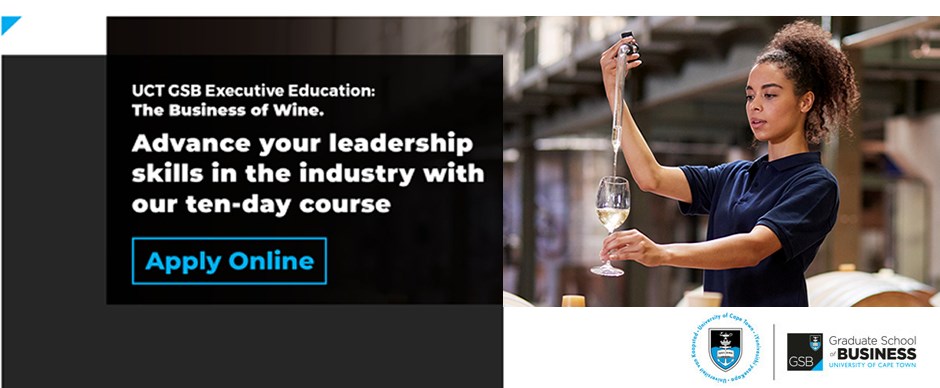“There is often a provenance challenge when it comes to South African wine,” says Dr Jonathan Steyn, who heads up the Business of Wine programme at the University of Cape Town Graduate School of Business (UCT GSB). Products from certain regions are regarded as more authentic and are therefore more revered and able to command better prices. For instance, some associate the world’s best coffee with Italy although coffee plants and some of the finest coffee comes from Ethiopia. Even when creating high quality products, emerging market producers are often devalued, a phenomenon known as the provenance paradox.
In this way, consumers disregard the status of wine made in South Africa, possibly contributing to its poor value performance over the past two decades compared to other producers in the global south. For example, in 20 years the average price point for SA’s packaged exported wines has barely increased by one dollar per litre, whereas New Zealand’s average prices more than doubled over the same period.
“One of our biggest hurdles in overcoming this dilemma is refining our identity, image and value proposition for the country brand. Nowadays, quality alone is not enough to improve premiums in the hyper-competitive global wine industry, particularly when it comes to emerging market brands,” explains Steyn.
Denzel Swarts, GSB graduate and founder of Son of the Soil Leadership Foundation further adds that the development of black and brown wine entrepreneurs and professionals across the value chain is critical in shaping an industry truly reflective of its origin. Phil Bowes from VinPro further explains that: “In terms of black-owned farms, there are about 54 in the country, and about 60 brands are black-owned. In an industry of this size, this only represents around 3% of the market.”
Steyn argues that this is why initiatives to promote transformation through wine business skill-development are essential.
“South Africa has been producing excellent wine for many years because there is a wealth of wine production education and training. However, very little attention has been devoted to developing specialised wine business acumen, leading to premiumisation challenges faced by wine business leaders.”
It was with this in mind that the UCT GSB developed a business course focused specifically on the wine industry. It was the first of its kind in South Africa and is intended to up-skill wine industry professionals across the value chain, stimulate transformation and create blended value.

The course covers a range of topics from wine history, strategy, marketing and innovation, to sustainability and leadership.
“We soon realised that the wine industry, especially in emerging markets, is complex and requires a specialised skill-set. The overall aim of the course is to enhance critical thinking, problem-solving and creativity while improving conceptual agility and people skills,” Steyn says.
This is assessed through developing a workable business plan and analysing a wine business case study effectively.
“Our aim is to transform the way that delegates view their industry, which is why we not only encourage candidates from all different wine-related fields to attend, we also foster collaborative innovation and learning through teamwork. A soil scientist and a sommelier, although coming from opposite ends of the value chain, have a lot to learn from each other.”
Mahalia Kotjane, assistant winemaker at Lievland Wine Estate and graduate of the Wine Business Management programme commented on the teaching approach.
“The course was a real eye-opener for me. The technical skills in this industry are very much isolated from the rest of the business, so I was interested in the marketing side as I believed it would help me to understand and improve my own position. I expected the lecturers to simply lay out a step-by-step guide on how to market or manage businesses in this space, but I was pleasantly surprised to find that there was room for every participant’s individual style and perception of their role in the wine world. It gave me the best possible holistic understanding of the business.”
Rosemary Mosia, CEO of The Bridge of Hope winery, alumnus and lecturer on the Business of Wine course says that it transformed her thinking. “Simply having other experts on the course who show you which qualities to look for when tasting wine, or how marketing efforts really play out in real world scenarios, has changed my outlook immensely.”
Steyn adds that the course was developed with the help of world-class industry experts – both local and international.
“We didn’t restrict input to academic experts. Instead this course was guided by industry from the outset. We try to balance delivering theoretical knowledge and practical experience. After all, the focus must be on informed practical application. We push our delegates to the very edge of their comfort zones by challenging them with new ideas and wine business dilemmas. In this way we develop their critical business thinking and creative problem-solving capabilities, something the sector desperately needs.”
Applications are open for the next UCT GSB Business of Wine course, which runs from 23 May to 26 July.
For further information please visit www.gsb.uct.ac.za/executive-education/wine-business.